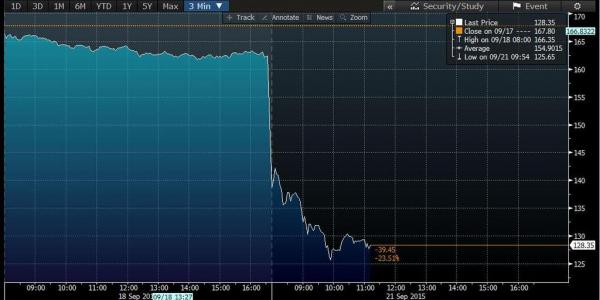After sliding early in Sunday pre-market trade, overnight US equity futures managed to rebound on the now traditional low-volume levitation from a low of 1938 to just over 1950 at last check, ignoring the biggest single-name blowup story this morning which is the 23% collapse in Volkswagen shares in the aftermath of the company’s emissions lying scandal which has cost the company €15 billion in market cap and has dragged Germany’s Dax lower…

… and instead have piggybacked on what we said was the last Hail Mary for the market: the hope of more QE from either the ECB or the BOJ. Tonight, it was the latter and while Japan’s market are closed until Thursday for public holidays, its currency which is the world’s preferred carry trade and the primary driver alongside VIX manipulation of the S&P500, has jumped from a low of just over 119 on Friday morning to a high of 120.4, pushing the entire US stock market with it.
As Reuters reported over the weekend, sources suggest that the BoJ is again contemplating an overhaul of its QQE program with an increase in its JPY 80 trillion monetary base as its main option to achieve its inflation goal, adding that it has not ruled out moving away from its money printing program in the long term due to a lack of success in reaching the price goal. “QQE is not a programme intended to last another five, 10 years,” said a former BOJ policymaker with knowledge of current monetary policy deliberations.
However, the reason why ultimately any boost to Japan’s QE will fail is the same one we first pointed out in late 2014 and then again a few weeks ago: “with borrowing costs near zero, some BOJ officials doubt whether expanding QQE would help the economy much and some worry they might eventually run out of sellers if they accelerate the programme.… “Given the pace of the BOJ’s purchases under the QQE program that is under way … you could run out of willing sellers of JGBs by the end of 2017,” said Kalpana Kochhar, the IMF’s mission chief for Japan.” This is precisely what we warned on September 4, and while we are glad to see the caution making mainstream media, the implications of this realization will surely not be grasped for many months to come.
Elsewhere in Asia, equity markets traded mostly lower following Friday’s negative close on Wall Street, where the weakness in the commodity complex pressurised global equities. ASX 200 (-2.0%) underperformed as energy and basic material names dragged the index lower, while Shanghai Comp. (+1.9%) pared its opening weakness led by strength in the industrial sector, as the UK and China met to discuss opportunities for Chinese investment in infrastructure projects. Japanese markets are closed until Thursday due to several public holidays.
In Europe, Volkswagen (-23.0%) shares plunged following the reports that the automaker could face an USD 18 billion fine over the software made to meet clean-air standards during official emissions testing. At the same time, London listed RSA (-21.0%) shares lost over 20% in reaction to the reports that Zurich has pulled its bid for the company because it expects USD 200mln loss on the Chinese Tianjin port explosions last month. Nonetheless, despite the underperformance by the German DAX index (-0.5%), stocks in Europe traded mostly higher (+0.6%), with utilities and healthcare names leading the move higher.
The upside, albeit restrained, meant that both Bunds and Gilts traded lower, with Portuguese bonds outperforming their EU counterparts in reaction to Friday’s upgrade by S&P. This week will see supply slip to EUR 9bIn from the near EUR 15 billion seen last week, while in terms of redemptions, participants will have to wait until next week when things begin to pick up on this front.













Leave A Comment